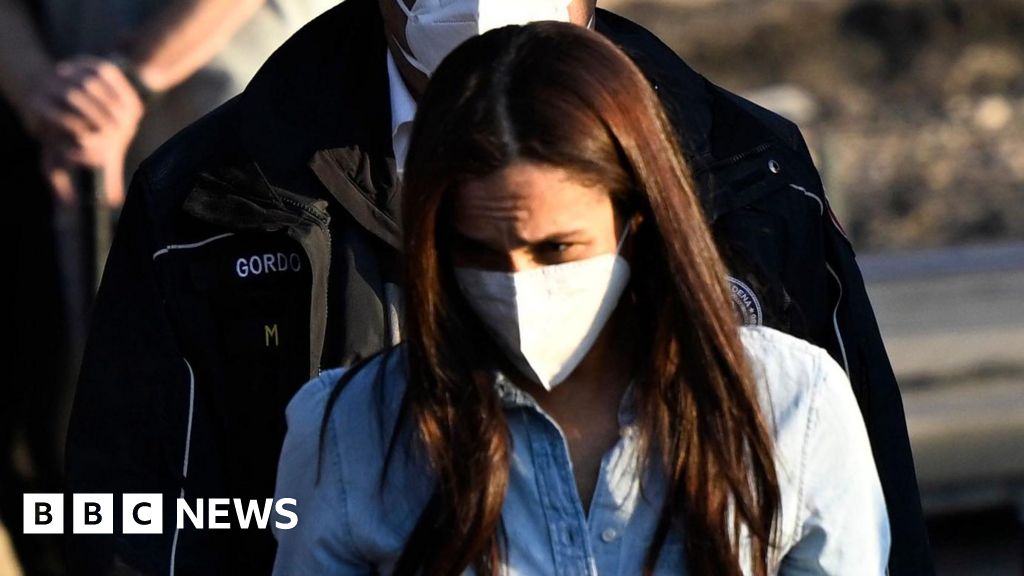ARTICLE AD BOX
By Steven McIntosh
Entertainment reporter
image source, Channel 4
image captionStephen Graham plays a man with young-onset Alzheimer's, one of the residents cared for by Jodie Comer's SarahA new one-off drama explores the impact Covid-19 had on care homes during the early stages of the pandemic, and shines a light on the exhausted care workers who kept them going.
Channel 4's Help introduces viewers to a young woman named Sarah (played by Killing Eve star Jodie Comer). It's early 2020, coronavirus has not yet reached the UK, and she has just applied for a new job in a fictional Liverpool care home.
Sarah is presented as being a little rough around the edges and not somebody who excelled in school, but that's partly the point. The show makes clear from the outset that the kind of skills you need to be a good care worker are personal, emotional and physical - not necessarily the kind of things you learn in the classroom.
Time star Stephen Graham, who plays one of the care home's residents in the film, says the kind of temperament required for the job can be hard to find, and easy to under-estimate.
"It takes a special kind of human being to be a carer," he says at the show's BFI launch. "I've had children, had to change my children, wash and bathe them, that's one thing. But to do that for an older person, someone who's coming maybe towards the end of their life, you're trying to make their days as comfortable as can be.
"For someone to do that day in, day out, and not just the practical but the humane aspect - maybe you're the only person George and Janet see all day. You're their source of the outside world, their communication. And this is what's so beautiful about our story, we see [Sarah] come alive. Maybe she wasn't the most gifted academically, maybe she wasn't going to change the world with her brain, but she's changing somebody's life."
image source, Channel 4
image captionSarah learns about the first UK Covid death from a news bulletin on the radioThe first chunk of the film, which is written by Jack Thorne, sees Sarah adapt to her new job and become friendly with the residents. She develops a particular connection with Tony (played by Graham), a 47-year-old man who has young-onset Alzheimer's.
There are only light references to Covid at this stage - in one scene, Sarah hears a news bulletin on the radio while she's driving, which notifies her of the first UK Covid death.
But then, as was the case in real life, things start to change rapidly. The care home is suddenly in serious trouble. Multiple residents catch the virus, many of whom have slim chances of survival, and there is a shortage of staff as many of Sarah's colleagues have to self-isolate.
The most compelling part of the film is undoubtedly the sequence where Sarah is left to fend for herself on a night shift. She works solidly for 20 hours, with no other staff around, struggling to cope as one Covid-ravaged resident finds it increasingly difficult to breathe.
In an unbroken, 25-minute single take, the camera follows Sarah as the nightmare unfolds around her. Sandwiched between two commercial breaks, it's a highly-effective sequence filmed in a style reminiscent of movies such as 1917, which makes you feel thoroughly engrossed in what's going on.
image source, Channel 4
image captionOne 25-minute sequence, filmed in a single take, follows Sarah on an exhausting night in the care home"I think that big sequence was probably the most difficult for us all," says Comer. "And Marc [Munden, the director] really pushed me on that, I remember there was a moment, we'd done this whole take and I was so in my own head and I was like, 'I think we've got it,' and Marc was like, 'No, we're going to do one more,' and I was like, 'Uhh, okay.'
"And we did it again, and the moments we got in that second take we never would have got in the first. And I think Marc was phenomenal at that, knowing when to push you that little bit more. That was probably the most difficult for all of us, because we had to huddle together and act as a team."
Preview screeners have broadly gone down well with critics. Digital Spy's Abby Robinson described Help as "one of the most affecting pieces of television ever to grace the small screen".
"You might think that you've come to terms with the past 18 months and all of the horrors it's entailed. Perhaps you have. Time can be a great healer, after all," she wrote.
"But Help might well be too painful a watch for some, such is the unflinching nature of Thorne's storytelling, coupled with Munden's innovative use of light and space, and award-worthy performances from Comer, Graham and the supporting cast."
image source, Reuters
image captionMatt Hancock, the former health secretary, can be heard on the radio in one scene discussing the care homes crisisVictoria Segal of The Times said: "The relationship between Sarah and Tony is the emotional heart of the piece, but it is shadowed by the horrific depiction of Covid's ravages... Sensitive but also deeply angry, this is a fierce piece of witness-bearing."
Unfortunately, the drama goes in a rather bizarre direction in its final movement and pushes the boundaries of plausibility. It slightly lets down the rest of the film, but provides it with a dramatic climax. "The final 20 or so minutes may or may not work for you," acknowledged Robinson in her review.
Thorne, well known for writing TV dramas such as National Treasure and the play Harry Potter and the Cursed Child, said he felt passionately that the programme should stick up for care workers.
"There were carers who felt responsible [for the crisis], and that was the bit that felt unforgiveable for me," he says. "Carers are massively undervalued, and they were massively undervalued during the pandemic."
The drama tackles a multitude of issues faced by carers - including a lack of personal protective equipment (PPE) and the difficulties getting an ambulance to attend care homes as the emergency services strained under the pressure.
image source, Channel 4
image captionThe drama reflects how families could not be in the same room as their loved onesMunden adds: "We were talking to people who hadn't had time to grieve, and they felt responsible, but they also felt they'd been betrayed, and that was really upsetting. Because it hadn't stopped by the time we'd started the research. I do feel the government completely betrayed the care sector compared with the NHS."
A Department of Health and Social Care spokesman told BBC News: "Throughout the pandemic we have done all we can to protect vulnerable people in adult social care. We have provided billions of pounds to support the sector including on infection and prevention control measures, free PPE, additional testing and priority vaccinations.
"Since the start of the pandemic we have committed over £6bn to councils through un-ringfenced grants to tackle the impact of Covid-19 on their services, including adult social care. This is in addition to over £2bn of specific funding to reduce transmission and bolster the workforce."
Comer says Channel 4 put her in touch with several care homes across the UK so she could research her role. "And they were so open and willing to chat to me, they said nothing was off limits," she recalls.
"To have that access was incredible, and also for me, there's so much joy and love within these homes... there is no black and white, it's not residents and carers, it's a family, and they act on instinct."
image source, EPA
image captionComer has previously thanked Graham for kick-starting her career when he recommended her to his agentThe film is set in Liverpool, which means that both Graham and Comer speak with their real-life accents. It's particularly unusual for Comer. She's best known for playing Russian assassin Villanelle in Killing Eve, while her recent film roles, such as Free Guy, have seen her take on American or southern-English accents.
"I loved it, and it's the first time I've been able to do it in a long, long time," she says of acting in her Scouse mother tongue. "It was probably a part of myself where I thought, 'I need to do another accent to be more involved and get lost in a character,' but it was so wonderful to be able to do it and do it with Stephen, my accent gets so much stronger when I'm around him."
The pair go back several years - it was Graham who initially recommended Comer to his agent after they worked together on the BBC mini-series Good Cop. That set Comer on the path to becoming one of the UK's biggest actresses.
"To work with her, look, I think she's rapidly going to become one of the finest actors we've ever had, she's on that ascendency," says Graham. "And she's exactly the same as that young, sweet woman I met a few years ago."
Help airs on Channel 4 at 21:00 BST on Thursday.

 3 years ago
39
3 years ago
39








 English (US) ·
English (US) ·